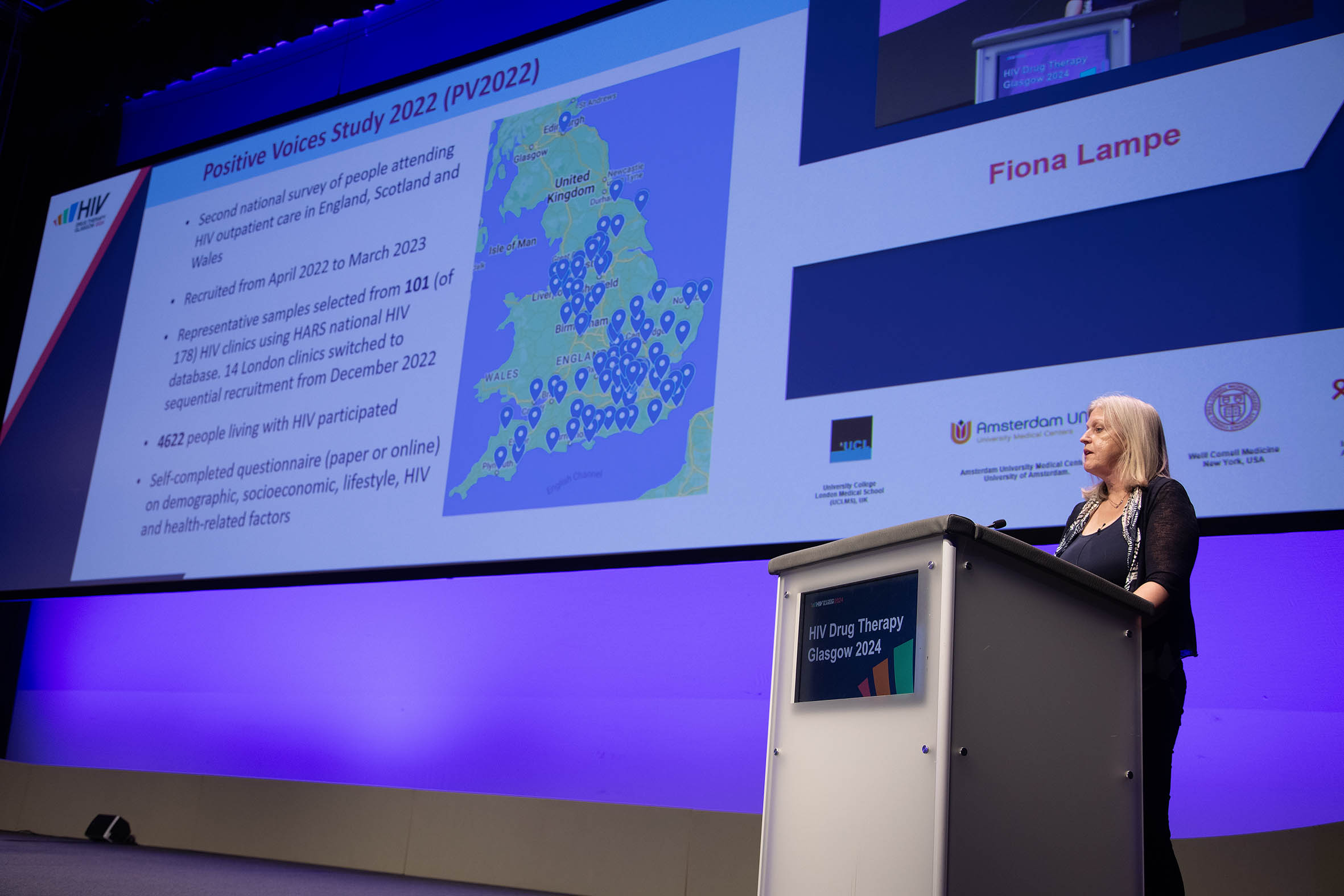23% of people with HIV in the UK have depression or anxiety, but rates are much higher in some groups
Roger Pebody, reporting from HIV Glasgow, 15 November 2024
Strong evidence of the links between mental health and socioeconomic disadvantage, lack of social support and stigma emerge from a large, representative sample of people attending HIV clinics in the United Kingdom. While 21% of people with HIV had symptoms of depression, this rose to 37% of people who felt ashamed of their HIV status and 50% of those who did not have enough money for basic needs, Dr Fiona Lampe of University College London told the HIV Drug Therapy Glasgow conference this week.
Between April 2022 and March 2023, 4622 individuals accessing HIV care at 99 clinics in England, one clinic in Scotland and one clinic in Wales took part. This represents around 5% of people attending HIV care that year. Recruitment was largely through probabilistic sampling but due to under-recruitment at some services, the strategy was changed to sequential sampling for 14 London clinics. The self-completion questionnaires included questions about symptoms of depression and anxiety, derived from the PHQ-9 and GAD-7 screening tools respectively.
Of the 4247 participants with information on mental health, 59% were gay, bisexual and other men who have sex with men, 24% were women, and 20% were people of black African ethnicity. The median age was 44, around three-quarters had been diagnosed for over a decade and 98.9% were taking HIV treatment. Overall, 21% of people had symptoms of depression, including 5% who had severe symptoms. Fifteen percent had symptoms of anxiety, including 7% with severe symptoms. There was considerable overlap between the two, with 23% having either problem and 13% having both.
Lampe compared these figures with previous studies of people living with HIV in the UK, conducted between 2011 and 2016, even if there are differences in the studies’ populations and methodology. She was looking for possible changes in the prevalence of mental health symptoms over time, perhaps due to improvements in HIV treatment or knowledge of “Undetectable equals Untransmittable” (U=U), or the negative impact of the COVID-19 pandemic. Prevalence for both problems was between 5% and 10% higher in the previous surveys, providing tentative evidence for an improvement over time.
In the new survey, symptoms were more commonly reported by the younger people, trans and non-binary people, and those diagnosed with HIV in the most recent time period. There were strong, statistically significant associations between depression symptoms and several socio-economic factors, and between anxiety symptoms and the same socio-economic factors. Lampe reported these associations as adjusted prevalence ratios, with statistical adjustment for age group, demographic group and year of HIV diagnosis. But the results are probably easiest to absorb when expressed as simple percentages. Whereas 14% of people with employment had depression symptoms, this was the case for 43% of people who were unemployed and 62% of those who were off work because of sickness or disability. Thirty five percent of people renting social housing and 56% of people who were homeless or in temporary accommodation had depression symptoms.
As financial hardship increased, so did symptoms of depression. They were reported by 11% of those who said they had enough money for basic needs like food and rent, 27% of people who “mostly” had enough money, 32% of those who “sometimes” had enough, and 50% of those who did not have enough money. Looking at social support, 43% of those who received less social support than they would like had depression, rising to 48% of those with “much less” support than they would like. In statistical terms, this relationship was especially strong – for the latter group, the adjusted prevalence ratio was 7.08, in comparison with people who had as much support as they would like.
In terms of stigma and self-stigma, 62% of people who had felt excluded from family activities because of HIV and 37% of those who “strongly agreed” that they were ashamed of their HIV status had depression. However, the relationship with belief in U=U was weaker – 19% of those with a strong belief in U=U had depression symptoms, compared to 23% who did not strongly believe.
People who had another long-term health condition in addition to HIV were more likely to have depression (28%) than people with HIV alone (16%). Rates were also elevated in smokers (32%), people using non-injection drugs (23%) and people who injected drugs (39%). There was a U-shaped relationship with alcohol – mental health symptoms were least common in those with moderate consumption, but were elevated in both non-drinkers and hazardous drinkers.
For all these factors, there were similar relationships with anxiety symptoms. Around half of those with symptoms of depression or anxiety weren’t receiving any treatment for it. Only 38% of Black African heterosexual men with symptoms were receiving treatment, compared to 74% of gay, bisexual and other men who have sex with men.
The survey also identified people who were receiving treatment (medication or talking therapy, or both) but did not have symptoms, presumably because the treatment was working. Considering both symptoms and treatment, 36% of people with HIV had evidence of a current mental health problem.
“Results emphasise the continued importance of identification and management of depression and anxiety among people with HIV, with interventions that include a focus on socioeconomic and social needs,” Lampe concluded.
Reference
Lampe F et al. Depression and anxiety symptoms among people with HIV in the UK: prevalence, correlates and treatment. Results from the Positive Voices 2022 study. HIV Glasgow 2024, abstract O42.
Congress delegates can view the presentation here.
All abstracts from the congress are available here (open access).
Reporting from HIV Glasgow 2024 by Keith Alcorn, Gus Cairns and Roger Pebody has been financially supported by the Congress. The writers are editorially independent of the Congress and the presenting speakers.
Photo credit: Alan Donaldson Photography
